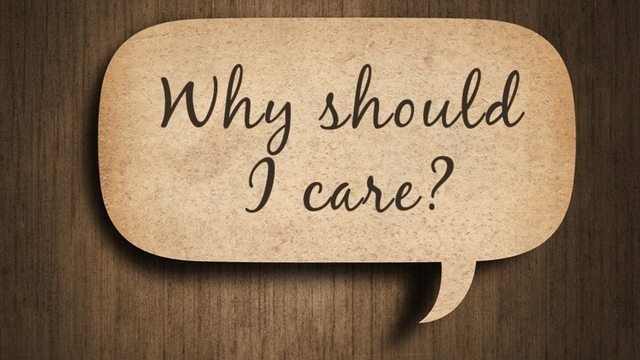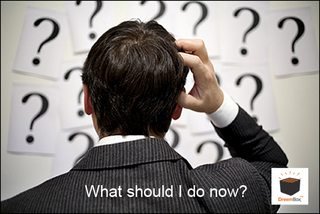There Is No "Should," Only "Is"

I woke up this morning and went for a run, leaving while it was still dark outside. I really love the early mornings. Hardly anyone else is up, let alone out in the streets. Everything is silent and still. As each step struck the pavement, something inside me resonated, "Yes. This is where I should be." My morning run is a time to be quiet, center myself, pray, reflect.
This line of thought continued. "I only get out a couple mornings a week; I should be out here more." And still further, "Yesterday would have been perfect. It was such a hard day. I should have started it with a run." And then even more: "I should rearrange my schedule to get me out here at least four times a week. Who knows? Maybe I should train for a marathon!" Before I knew it, my moment of peace was lost to the "should's." The stillness had been broken, and my mind was invaded by a multitude of possibilities - some lost forever, some yet to come, and some just unrealistic fantasies. I had lost my sense for the present.
My title for this article mimics one of Yoda's most famous quotes - "Do. Or do not. There is no try." - but instead, a bold statement that questions the value of potential and possibility: "There is no 'should,' only 'is.'"
The word "should" is laden with obligation - the obligation we set for ourselves, or the obligation put on us by others. "Should" implies that the way something happens, there is a right way and wrong way, a good way and a bad way. Out of all the possible directions, "should" gives us only one option.

Stuck in the Past: the Problem with "Should Have"
The phrase "should have" comes out when we reflect on what might have been. It only comes out when we feel regret, that the decision we made could have led to something different, something better. This phrase lives within a world of judgment, a wrong that could have been righted - if only...
It could be something simple, like feeling hungry at 10 am, thinking, "I should have had something other than coffee and a donut for breakfast!"
Or something that could have opened up a whole new possible direction: "That girl last night was amazing! I should have been bolder and asked for her number."
Or something serious, when we are filled with shame: "I shouldn't have said that to my friend. What was I thinking? He's never going to talk to me again."
It is worth saying that these "should's" aren't bad in themselves. In fact, they are a necessary starting point to self-reflection. In order to know how to make decisions for the future, we need to know how we got to where we are. And we need to imagine what we could have done differently, resulting in different outcomes.
But there is a big difference between "could" and "should." Just because something can happen, doesn't mean it should. There is no obligation to a "can." When can becomes should we get mired in regret, shame, and guilt.

Guilt Trips: the Problem with "Should"
What's amazing is that we can play out those same feelings of regret, shame, and guilt proactively before we've made the decision. This happens when we set ourselves towards a "should" for a future action.
My comment above: "I should get out and run more." I may or may not actually run, but I've set myself up for failure even before I've started. Now, because I've internally made this a "should," I can only live rightly (so to speak) if I follow through with this plan. If I fail to run, I have failed myself.
"Shoulds" are also innocuously put in moral or ethical statements that most would agree on: "I should be more kind to my colleagues at work. Even that jerk behind the front desk." Hard to disagree with that, right? Of course I would want to be a loving, more generous person. But notice this - what is the difference between saying "I should be more kind" and "I will be more kind?" Using "should" distances yourself from the commitment; it is like being half-deliberate, but still with full responsibility. Couching my commitment in "should" may keep me from making a decision now to be kind.

"Should" - According to Who?
Another thing to consider when speaking of "should" is the authority that the obligation comes from. "You should do this," or "I should do that" - well, who says? Who has that authority to obligate me or others into this one "right" way of action?
I wouldn't go so far as to say that no one has the right to obligate another to a "should." There are a number of people I would gladly follow to the grave, that could tell me I should or should not do something. The question, though, is: do you trust them as an authority to you? Do you willingly give them the right to obligate you?
Your wife coming to you saying, "You should consider me more when you make these big financial decisions." is much different than your coworker's gripe, "Where are those TPS reports? They should have been done hours ago!"
But most of the time, these are trips we lay on ourselves. We have such high expectations of ourselves and we set such lofty goals that we will never live up to. Then we are overwhelmed with feelings of failure for not achieving what we set out to do.
Missing out on Now
Now, here is the secret. If I were trying to clickbait you, this would be "one weird trick that will change your life forever!" The secret is this...
Fully taking in the present moment, living in the now, is the best way to redeem the past and change the future.
For the sake of simplicity, let me take the example of my morning run as I explained in my introduction. I was feeling so good about the present moment I was in, I wished that I had experienced this more frequently. I began to regret: "I should have been out here running yesterday..." Yet what good does this regret do me? Yesterday has come and gone, but here I am - right now - doing what I absolutely love. Take it in, all the way in. Let the moment resonate to my core. Let the experience of inner peace and solitude shape me. What didn't happen yesterday is happening right now.
This same feeling that led me to regret also beckoned me to participate even more. Do this not just now, in this moment, but in the future as well. This is a good thing, a good goal. But what is going to motivate me to come out tomorrow? Is it a vague "should" that reminds me of the shame I'll face if I don't act? This is a motivation of fear and guilt. It won't last long. What will last is having a fuller appreciation for why I would want to run more frequently. And the only way of doing that is experiencing the moment to its fullness. Live in the now and take it all the way in. I will be moved; I will be changed.
In this way, my very presence in the moment protects me from guilt and frustration. My past choices are redeemed as I give myself to the present. My future choices will be impacted as I welcome this moment of now.
For Further Study
There was a recent TEDx talk given by Phuc Tran, called "Grammar, Identity, and the Dark Side of the Subjunctive." He argues that the absence of the subjunctive case (which includes "should") in the Vietnamese language makes them a happier people. They aren't paralyzed by the possibilities of what could have happened, or what might happen, or what should be the case. He sees a cultural view of living in the moment, unburdened by guilt trips or wishful thinking.
For those that like to investigate all sides of matter, here is a contrarian response to this TED talk: The Truly “Dark Side of the Subjunctive”
And finally, I'll leave you with this:

Come join us on Discord! https://discord.gg/7qyarFD
nice post!